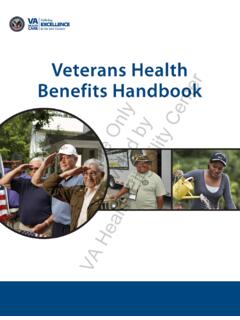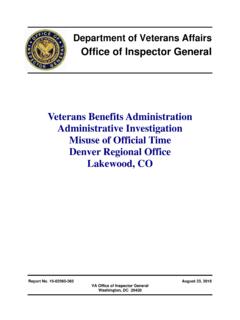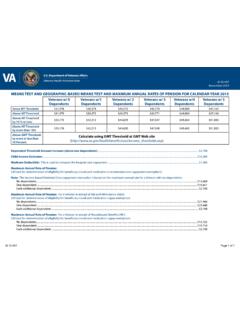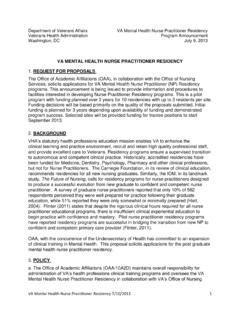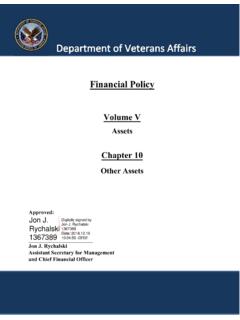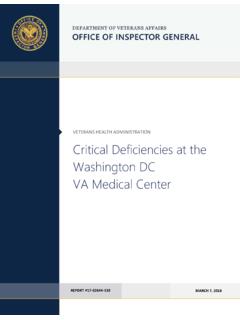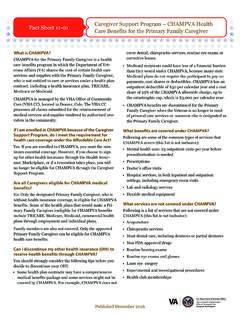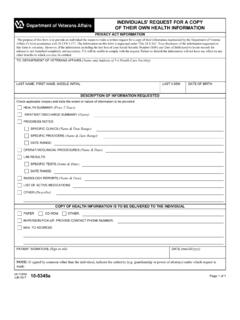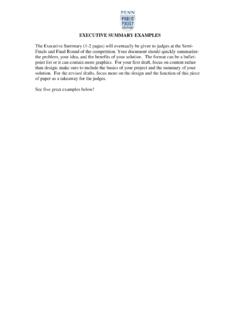Transcription of Appointment Management During the COVID-19 Pandemic
1 Office of Audits and Evaluations VETERANS HEALTH ADMINISTRATION. Appointment Management During the COVID-19 . Pandemic REVIEW REPORT #20-02794-218 SEPTEMBER 1, 2020. The mission of the Office of Inspector General is to serve veterans and the public by conducting meaningful independent oversight of the Department of Veterans Affairs through independent audits, inspections, reviews, and investigations. In addition to general privacy laws that govern release of medical information, disclosure of certain veteran health or other private information may be prohibited by various federal statutes including, but not limited to, 38 5701, 5705, and 7332, absent an exemption or other specified circumstances. As mandated by law, the OIG adheres to privacy and confidentiality laws and regulations protecting veteran health or other private information in this report. Report suspected wrongdoing in VA programs and operations Report suspected wrongdoing in VA programs and operations to the VA OIG Hotline: to the VA OIG Hotline: 1-800-488-8244.
2 1-800-488-8244. Appointment Management During the COVID-19 Pandemic Executive Summary The COVID-19 Pandemic has had a major impact on VA's mission of providing health care for veterans through the Veterans Health Administration (VHA). The VA Office of Inspector General (OIG) conducted this review to assess VHA's Appointment Management strategies During the Pandemic and the state of VA medical facilities' canceled appointments. The review team assessed the data on about million appointments canceled from March 15, 2020, through May 1, 2020, to help clarify for VA the processes and places that may need attention to address the needs of patients who had appointments at VA facilities canceled. VA operates the largest integrated healthcare system in the United States, with over 1,200 medical facilities serving more than million enrolled veterans. Providing access to timely care at VA facilities continues to be a challenge for VHA, despite increased facility staffing, internal process improvements, and expanded community care and telehealth options.
3 Recently, this access challenge has been exacerbated as both VA facilities and community providers have curtailed nonurgent and routine healthcare appointments to avoid placing staff and patients at unnecessary risk of contracting COVID-19 and to preserve limited supplies and equipment. The OIG recognizes the efforts of all VHA personnel who are working in stressful conditions and risking exposure to COVID-19 as they manage the needs of patients and employees. Canceling a significant number of nonurgent appointments over a short period of time increases the risk of facilities losing track of patients who require rescheduled appointments for care. Given the significant and fast-paced changes from standard operations, it is critical for VHA to provide its medical facilities timely, clear, and consistent direction, and to execute a sound strategy to follow up with patients During and after the Pandemic . The review team assessed whether facilities were converting, canceling, classifying, and annotating patients' appointments consistent with VHA's evolving guidance.
4 The team also assessed the number of appointments VHA facilities conducted virtually and the number that still require follow-up. This report provides a system-wide assessment that can be used to guide medical facilities' efforts to ensure all patients with canceled appointments receive the follow-up required to meet their needs. What the Review Found VHA and its medical facilities took measures to protect patients and employees from COVID-19 . by canceling scheduled nonurgent face-to-face appointments. VHA issued its initial guidance to VA OIG 20-02794-218 | Page i | September 1, 2020. Appointment Management During the COVID-19 Pandemic medical facilities for canceling appointments on March 15, 2020, and followed up with a series of memorandums that contained additional guidance or Beginning March 16, 2020, the number and rate of canceled appointments began to increase substantially. From March 15 through May 1, 2020, VA medical facilities canceled about million appointments about million more than were canceled from February 1 through March 14, During that time, facilities made significant efforts to see patients virtually or to track patient cancellations for rescheduling, but still have much work to do in following up on the appointments canceled During the COVID-19 Pandemic .
5 VHA Needs to Follow Up on Over Two Million Appointments Canceled During the COVID-19 Pandemic The OIG determined that of the million appointments canceled from March 15 through May 1, 2020, about million (32 percent) had no indication of follow-up or tracking at the time of the review, as shown in figure 1. These appointments included primary care, mental health care, and specialty care. Because facilities do not have a tracking mechanism associated with these cancellations, such as an open consult (a referral) or a reminder to call and reschedule appointments, this poses a significant risk to patient care. No Evidence of Follow-Up Evidence of Follow-Up or Tracking 0 1 2 3 4 5 6. Millions Figure 1. Cancellations with evidence of follow-up and no evidence of follow-up. Source: VA OIG analysis of VHA cancellation data (by date of cancellation). VHA created a monitoring tool for its Appointment cancellation data that should allow it to identify and communicate specific issues to leaders and facilities.
6 According to VHA's Office of Veterans Access to Care (OVAC) personnel, OVAC developed training and tools for facilities to 1. VHA Memo, Coronavirus ( COVID-19 ) Guidance for Elective Procedures, March 15, 2020. 2. The cancellations discussed in this report were primarily for appointments scheduled for patient care. Also included were non-count appointments such as laboratory, x-ray, ultrasound, and Magnetic Resonance Imaging (MRI). VHA Directive 1230 defines non-count as workload that does not meet the definition of an encounter or an occasion of service. The OIG team included all cancellations in this review to ensure all previously scheduled appointments are considered for follow-up. VA OIG 20-02794-218 | Page ii | September 1, 2020. Appointment Management During the COVID-19 Pandemic manage appointments and consults During and following the Pandemic . OVAC stated that facilities have been instructed to review all cancellations, and that each facility is responsible for executing follow-up actions based on its clinical review.
7 VHA Provided Virtual Care and Tracked Canceled Appointments About five million appointments (68 percent) canceled During the review period had evidence of follow-up or other tracking. This generally means the patient was able to complete the Appointment virtually by telephone or video, or the Appointment had been rescheduled. This figure also includes canceled appointments that are tracked in VA's scheduling system in various ways but does not mean the Appointment has been rescheduled. Many cancellations likely still need to be rescheduled for an in-person visit or converted to virtual appointments. These tracking mechanisms include healthcare providers' orders for the patient to return to the clinic, open consults, and recall reminder alerts for patients to call back for an Because these appointments are associated with patients who have a return to clinic order, an open consult, or a recall reminder, facility employees will be prompted to review and reschedule the appointments as needed.
8 VHA facilities have significantly leveraged virtual appointments During the Pandemic . Of the cancellations that occurred from March 15, 2020, through May 1, 2020, VHA data indicated facilities converted about million of the canceled appointments to telephone or video appointments. These conversions account for a portion of the total virtual appointments, as additional appointments were scheduled to be virtual when created and were not the result of a conversion. Overall, VHA data indicated that facilities completed about million virtual appointments During March and April 2020 predominately by telephone and some by video. Facilities Did Not Consistently Annotate Appointments Canceled Due to COVID-19 . During March 2020, VHA issued memorandums that contained guidance important to tracking cancellations. This included labeling Appointment cancellations with the keyword COVID19 in the remarks Using this keyword correctly could have allowed VHA to better determine which appointments needed to be rescheduled.
9 3. VHA policy states that a consult may revert to an active status when an Appointment is canceled, and that the active status indicates that efforts are underway to schedule the consult. A return to clinic order is when a provider indicates a specific return date for an Appointment that is deemed clinically appropriate. VHA policy states that a recall reminder is used as a tickler' file where established patients are held' until they call and request a follow-up Appointment .. 4. VHA Memo, Outpatient Clinic Appointment Scheduling Management in Response to COVID-19 Pandemic , . March 22, 2020. VA OIG 20-02794-218 | Page iii | September 1, 2020. Appointment Management During the COVID-19 Pandemic The review team's analysis of VHA's data on canceled appointments determined that about 55 percent of cancellations from March 15, 2020, through May 1, 2020, included COVID. annotations in the remarks section of the canceled Appointment .
10 The review team could not confirm whether the remaining 45 percent of cancellations occurred because of the COVID-19 . Pandemic and determined it was possible that facilities were not always aware of whether patients canceled their appointments due to COVID-19 or other reasons. However, based on the timing of these cancellations and the guidance from VHA to cancel nonurgent appointments During this period because of COVID-19 , it is reasonable to infer that the vast majority were canceled due to COVID-19 . The review team determined that VA medical facilities would not be able to solely rely on COVID remarks for rescheduling purposes because they did not consistently add the remarks to appointments canceled due to COVID-19 . The team concluded that facilities would need to review and make rescheduling efforts for all appointments canceled During the COVID-19 . Pandemic regardless of whether the cancellation included a COVID remark.

